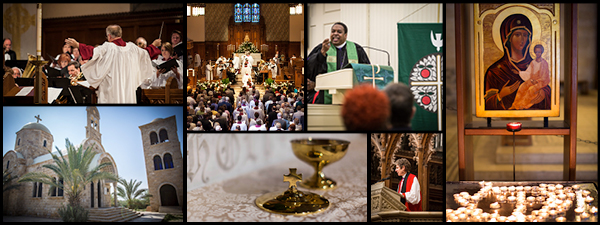

Christianity is the world's largest religion, with more than 2.4 billion followers globally (about a third of the world’s population). Three quarters of Americans identify as Christian, and while other countries have higher percentages of Christians among their populations, the United States has the largest number of Christians of any country. All Christians believe in the life, teachings, miracles and resurrection of Jesus Christ. Beyond that, Christian denominations are very diverse in their beliefs, rituals and practices.
Christian churches in America fall into a number of denominations and sub-groups, including Catholic, Orthodox, mainline Protestant, evangelical, fundamentalist, and charismatic churches. Even some of these terms do not fully represent or identify some religious groups.
There are nearly 1.3 billion Roman Catholics worldwide; more than all other Christian denominations combined. More than 70 million Americans identify as Catholic, about 20 percent of the nation’s population. It is the largest religious denomination in the U.S., followed by the Southern Baptist Convention, The United Methodist Church, The Church of Jesus Christ of Latter-day Saints, and the Church of God in Christ (the nation’s largest African American denomination). Other large denominations include the National Baptist Convention, USA (the second largest African American group), Evangelical Lutheran Church in America, National Baptist Convention of America (the third largest African American denomination), Assemblies of God, Presbyterian Church (USA), and African Methodist Episcopal Church.
Many Americans of Arab, African, Middle Eastern and Eastern European heritage are Orthodox Christians. An estimated 3 to 6 million Orthodox Christians live in the U.S. This includes Coptic Christians.
Some churches have a clear hierarchy while others may have less defined structures or even loosely defined ones. Be sure to understand the spiritual leadership and governance.
The term “mainline Protestant” has generally referred to what were the historically established Protestant groups in the United States. These include: American Baptist Churches in the USA, the Episcopal Church, the Evangelical Lutheran Church in America, the Presbyterian Church (USA), the United Church of Christ, and the United Methodist Church. Some sources add the Christian Church (Disciples of Christ), Friends (Quakers), and some other churches. In recent decades, there has been growing movement toward evangelical churches, which often believe the Bible is inerrant and believe in a personal spiritual rebirth. Charismatic churches are not necessarily tied to a denomination and their belief systems can vary. However, most charismatic churches believe in “receiving” or “being filled with” the Holy Spirit and other supernatural experiences. These might include the gift of “speaking in tongues,” a nonhuman “angelic language.”
Journalists should be mindful when trying to explain the beliefs and practices of any group and pay close attention to the way they describe themselves. Christian churches – even within denominations – can interpret passages from the Bible very differently. While some groups – especially mainline Protestants – view the Bible in a more historical context, some others see it as inerrant. When dealing with members of any religious group, allow them to explain their beliefs. If you hear terminology that you do not understand or that you find provocative, ask for an explanation or clarification. Do not assume what it might mean. Understand who within a group is authorized to speak.
Religious scholars and theologians can provide valuable insight into beliefs, traditions and practices. Look for them on the faculties of religious-affiliated colleges, universities, divinity schools and seminaries. Some nonsectarian private universities may also have religious scholars on staff. Cultivating relationships with these individuals over time can be important when assistance is needed in dealing with sensitive and complex subjects or when working on deadline.
Most Christian denominations have local, state, regional and national offices or denominational organizations that can provide useful information. Understand that they will do so from their perspective and worldview.
The United States Conference of Catholic Bishops is the assembly of the Catholic hierarchy of the United States and the U.S. Virgin Islands. Its members include all active and retired members of the Catholic hierarchy.
The National Council of the Churches of Christ in the USA (most commonly known as the National Council of Churches), is the largest ecumenical body in the United States representing 38 Christian faith communities and more than 100,000 congregations from Protestant, Anglican, Orthodox, Evangelical, historic African American, and Living Peace traditions. The Washington, D.C.-based organization is often involved in issues related to social justice. Member organizations will have their own national offices and social media sites.
Below is a list of web sites for most major Christian denominations in the United States. It is not intended to be a complete list, although it does include most denominations with a substantial U.S. presence.
